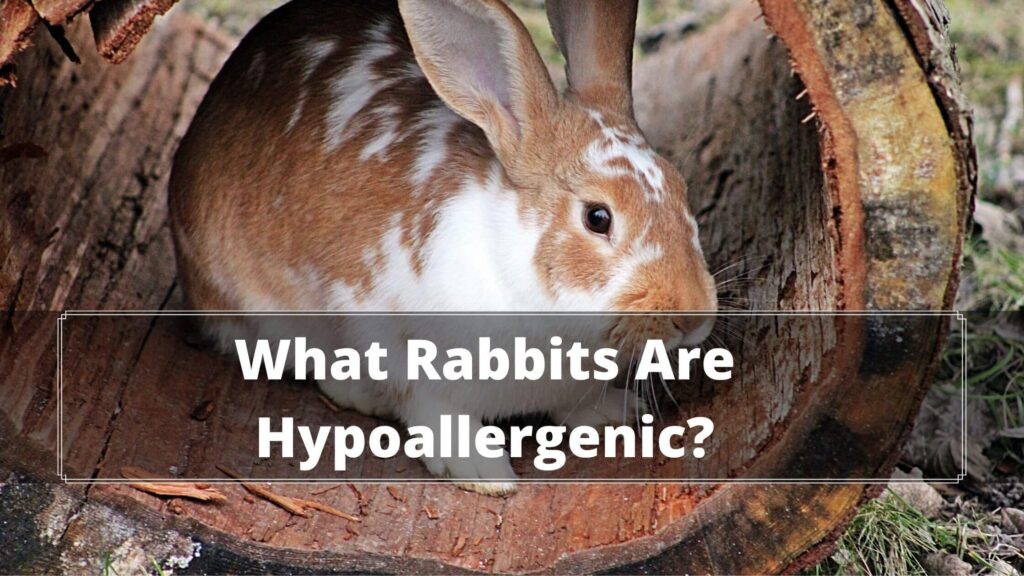In the modern world, wide varieties of rabbit breeds are available for adoption to keep as pets. But how many of them are suitable for allergy sufferers? In this article, I will give you a list that has been narrowed down to 5 breeds for allergy sufferers and five species that must be avoided.
I have done extensive research on your behalf to gather all the information about what rabbits are hypoallergenic and the best rabbit for allergies.
By the end of the article, you will have all the information about what sort of rabbit you should welcome in your home if you have mild to severe allergies. Let’s first discuss what causes allergies in rabbits.
- What Causes Allergies From Rabbits?
- What Rabbits Are Hypoallergenic?
- Are Pet Rabbits Hypoallergenic?
- Are Lionhead Rabbits Hypoallergenic?
- Are Rex Rabbits Hypoallergenic?
- Are Mini Rex Rabbits Hypoallergenic?
- Are Angora Rabbits Hypoallergenic?
- Are Netherland Dwarf Rabbits Hypoallergenic?
- Are Mini Lop Rabbits Hypoallergenic?
- Are Flemish Giant Rabbits Hypoallergenic?
- Are Dutch Rabbits Hypoallergenic?
- Are Holland Lop Rabbits Hypoallergenic?
- 5 Best Rabbit For Allergies
- 5 Rabbits To Avoid For Allergy Sufferers
- Conclusion
Post Contents
- What Causes Allergies From Rabbits?
- What Rabbits Are Hypoallergenic?
- Are Pet Rabbits Hypoallergenic?
- Are Lionhead Rabbits Hypoallergenic?
- Are Rex Rabbits Hypoallergenic?
- Are Mini Rex Rabbits Hypoallergenic?
- Are Angora Rabbits Hypoallergenic?
- Are Netherland Dwarf Rabbits Hypoallergenic?
- Are Mini Lop Rabbits Hypoallergenic?
- Are Flemish Giant Rabbits Hypoallergenic?
- Are Dutch Rabbits Hypoallergenic?
- Are Holland Lop Rabbits Hypoallergenic?
- 5 Best Rabbit For Allergies
- 5 Rabbits To Avoid For Allergy Sufferers
- Conclusion
What Causes Allergies From Rabbits?
The very first cause of allergy from the rabbit is its saliva. You might have noticed your rabbit grooming themselves many times a day. Therefore when they groom, the highly allergenic protein from their saliva gets deposited on their skin.
And, when your rabbit sheds, it also releases its protein allergens into the air and surrounding environment. This can irritate or trigger allergies and cause unpleasant symptoms among people with sensitive immune systems.
Such unpleasant symptoms include sore throat, itchy eyes, running nose, and more. Pet allergies can last around two weeks. It can be less or more depending on your medication or until you find a new baseline. But it doesn’t mean that you will not have pet allergies again. Here, you can learn about 11+ rabbit allergy symptoms.
As everyone is different, some people may not feel a difference until all the allergens are gone.Pet allergies can last around two weeks. It can be less or more depending on your medication or until you find a new baseline. But it doesn’t mean that you will not have pet allergies again.
As everyone is different, some people may not feel a difference until all the allergens are gone. The combination of shedding and protein-rich saliva is called pet dander. Pet dander is the main culprit of pet allergies.
By now, we have got to understand what you have to do to minimize the potential allergic reactions and which rabbit breeds are less likely to trigger your allergies.
What Rabbits Are Hypoallergenic?

The term “Hypo” means “less” in the word Hypoallergenic. Therefore, the rabbit that sheds the least is likely categorized as a hypoallergenic rabbit breed. Tan rabbit, Rex rabbit breeds, and mini rex rabbits are a few of the suitable species for allergy sufferers.
Do not that Hypoallergenic rabbits also produce allergens because of their coat but not as much as others of the same species. Therefore people with severe allergies, sensitive immune systems, or asthma might still get affected by hypoallergenic rabbits.
Even if there is no such thing as a complete allergen-free pet or animal, people with mild or minor allergies can have rabbit breeds that shed less and spread and accumulate less pollen.
So when looking for a hypoallergenic rabbit, always keep in mind that it’s all about reducing symptoms. Feeding the best rabbit hay for allergies helps the most. Some common breeds are frequently asked if they are hypoallergenic or not. Let’s get answers to these questions first, then find the five best rabbit breeds for allergies.
Are Pet Rabbits Hypoallergenic?
Few breeds like mini Rex rabbits and tan rabbits can be considered hypoallergenic pet rabbits because they shed less. There are no rabbits that are entirely allergen-free. Although some breeds shed less, they will still need occasional grooming if their hair is exceptionally long and prone to matting.
Read Our Complete Guide: Are Rabbits Hypoallergenic? 9 Tips For Allergy Sufferers
Are Lionhead Rabbits Hypoallergenic?
No. Lionhead rabbits are not hypoallergenic because they come with quite a long fur that sheds a lot in the spring. The more hair a rabbit has, the more it has to lose. Lion head rabbits need to develop a thick coat at the beginning of winter, which sheds a lot in the late spring.
Are Rex Rabbits Hypoallergenic?
Yes. Some members of the rex rabbit family are suitable for people with allergies because they produce less than the other domesticated pets. Because it’s spread less dander, it is the first choice for people suffering from mild allergies.
Are Mini Rex Rabbits Hypoallergenic?
Yes. Mini Rex rabbit is the most high-quality breed of any other species you can find in America’s market. It is also one of America’s most popular and favorite rabbits due to its sweet temperament, cuddly size, fluffy coat, appealing appearance, and delightful nature. They are also perfect for beginners and children as long as you know how to handle them gently.
Are Angora Rabbits Hypoallergenic?
No. Angora rabbits are not Hypoallergenic breeds. They do shed less than others but require frequent grooming. They need to be brushed regularly and clipped occasionally. Without proper grooming, they may shed aggressively at certain times a year.
Are Netherland Dwarf Rabbits Hypoallergenic?
Yes. Netherland dwarf rabbits can be considered hypoallergenic because they shed a little throughout the year. They come with a relatively medium short coat which requires less grooming. Hence, they are not as great pets as they are neither beginner-friendly nor kid-friendly.
As the Netherlands dwarf Rabbits also come from the wild rabbit’s genetics, they tend to be skittish sometime. Additionally, Netherland dwarf rabbits don’t like to be picked up or held. They are prone to bite and scratch when scared or frightened.
They are not suitable for children as pets. Another thing that keeps people from adopting this one is the deadly form of calicivirus, which is highly contagious. Therefore Netherland dwarf rabbits should be vaccinated against the virus at least once.
Are Mini Lop Rabbits Hypoallergenic?
No. Mini lop rabbits are not hypoallergenic because they tend to shed twice a year. Mini lop rabbits will likely replace their baby coat at around five months with a transitional jacket that will be cleared at a particular time of the year (Spring and Autumn).
Are Flemish Giant Rabbits Hypoallergenic?
No. Flemish giant rabbits are not a hypoallergenic breed. They are the worst rabbit for allergy sufferers. They need frequent grooming and tend to shed twice the year: spring and fall. Avoid adopting this breed if you have allergies, asthma, or a sensitive immune system.
Are Dutch Rabbits Hypoallergenic?
Dutch rabbits are not a hypoallergenic breed because they tend to shed a lot in the shedding season. They also require weekly brushing, which can be a lot of work for busy people. They are neither good for people with allergies nor people with asthma.
Are Holland Lop Rabbits Hypoallergenic?
No. Holland lop rabbits will shed heavily in the shedding season and grow in winter to keep their bodies warm. They will start replacing it with a lighter coat to keep their body warm throughout the summer. Therefore, Holland lop rabbits are not great for allergy sufferers and are not hypoallergenic.
5 Best Rabbit For Allergies

The Tan Rabbit
First, it’s a rabbit, not a hare, as most people mistake it. The tan rabbit breed has beautiful long and lean legs while featuring a smooth arch body structure. They come in compact sizes and don’t need extra grooming compared to most species.
They do have long hair but comparatively short fur that looks extremely beautiful. Their compact size and long hair length make them a suitable breed for people with mild allergies.
Californian Rabbit
This is the fifth most popular and domesticated rabbit made on our hypoallergenic breed list. California rabbits are primarily bred and raised for their court and meat. However, it doesn’t mean they make poor pets. They are excellent pets for seniors and first-time handlers.
They come in a relatively short coat, so they are less likely to pick up allergens than rabbits with long hair. However, it doesn’t mean that the Californian rabbit doesn’t shed.
You should be cautious if you adopt one in the sprint: every spring, most rabbit breeds, including Californian rabbit, shed. Californian rabbits may shed once or twice depending upon the care, but you will always need a groomer every spring.
The Rex Rabbit
Regarding commercial rabbits, rex rabbits are the most significant commercial breed. They are raised and farmed for meat purposes due to their muscle legs.
These rabbits come in different sizes and colors but are widely known for their strength and silky fur. The Rex rabbit is the most suitable breed for people with severe allergies because it sheds less. They have lovely rabbit traits, making them one of the best buddy pets.
Silver Fox Rabbit
Silver fox rabbit breeds are raised for commercial purposes and are famous for their meat and unique fur. However, they are also great at being pets for people with allergies. At first glance, you might get doubts about our list by looking at the coat.
They come with a longer coat than other rabbits mentioned in this list, but their fur never flies back when you stroke them in the opposite direction. It also means that their hair is less likely to spread around your house.
Their skin will also not get tangled or matted easily as their strands stay as it is when stroked instead of getting blended. Hence, this breed has fever chances of accumulating pollen or other allergens from any specific environment in certain situations.
This feature makes them one of the best rabbits for people suffering from allergies or families with children. As silver fox rabbits belong to the gentle rabbit group, they’re a suitable breed for children also.
Silver Marten Rabbit
This breed may be listed in the last but not the least hypoallergenic rabbit. This is one of the oldest rabbit breeds developed by breeding chinchilla rabbits with a wild rabbit in the 1920s. Silver Martin inherited the gorgeous thick but smooth fur that shed less.
The fact is, you don’t need to hire any groomer to maintain your rabbit fur because their fur characteristics make them a very well-known breed among allergy sufferers. Silver Marten Rabbit is one of the best candidates for hyper logic pet breath. You Can opt. They’re also excellent with children who love spending time with the owners.
5 Rabbits To Avoid For Allergy Sufferers
Most miniature hypoallergenic rabbits are suitable for people with mild to severe allergies. But here, I will talk about a handful of breeds you should avoid for this purpose. Read our complete guide on: Are Rabbits Good For Allergy Sufferers?
The rabbits that come with a longer coat or require significant grooming should always be avoided. The bunnies that frequently shed too. Here are four types of rabbits to avoid allergy sufferers.
- Angora Rabbits.
- Flemish Giant Rabbits.
- Jersey Wooly Rabbit.
- Lionhead Rabbit.
- Chinchilla Rabbit.
Conclusion
In conclusion, I recommend you adopt a mini Rex rabbit or tan rabbit as both are minor allergens carriers compared to others. Adding to this, the mini Rex rabbit tends to be the best option for people who have mild to severe allergies.
Keep your home clean and consider purchasing a good-quality air purifier with a Hepa filter. You can go with any of the five popular hypoallergenic rabbit breeds mentioned above. I hope you like this article and will share it.
Thank you for reading, and best of luck finding the right rabbit for your home and allergy. Make sure to read more on rabbit care & check other articles on our website. Next Post: Rabbit Snuffles: Can Rabbits Have Seasonal Allergies?

94% of pet owners say their animal pal makes them smile more than once a day. In 2007, I realized that I was made for saving Animals. My father is a Vet, and I think every pet deserves one. I started this blog, “InPetCare”, in 2019 with my father to enlighten a wider audience.
